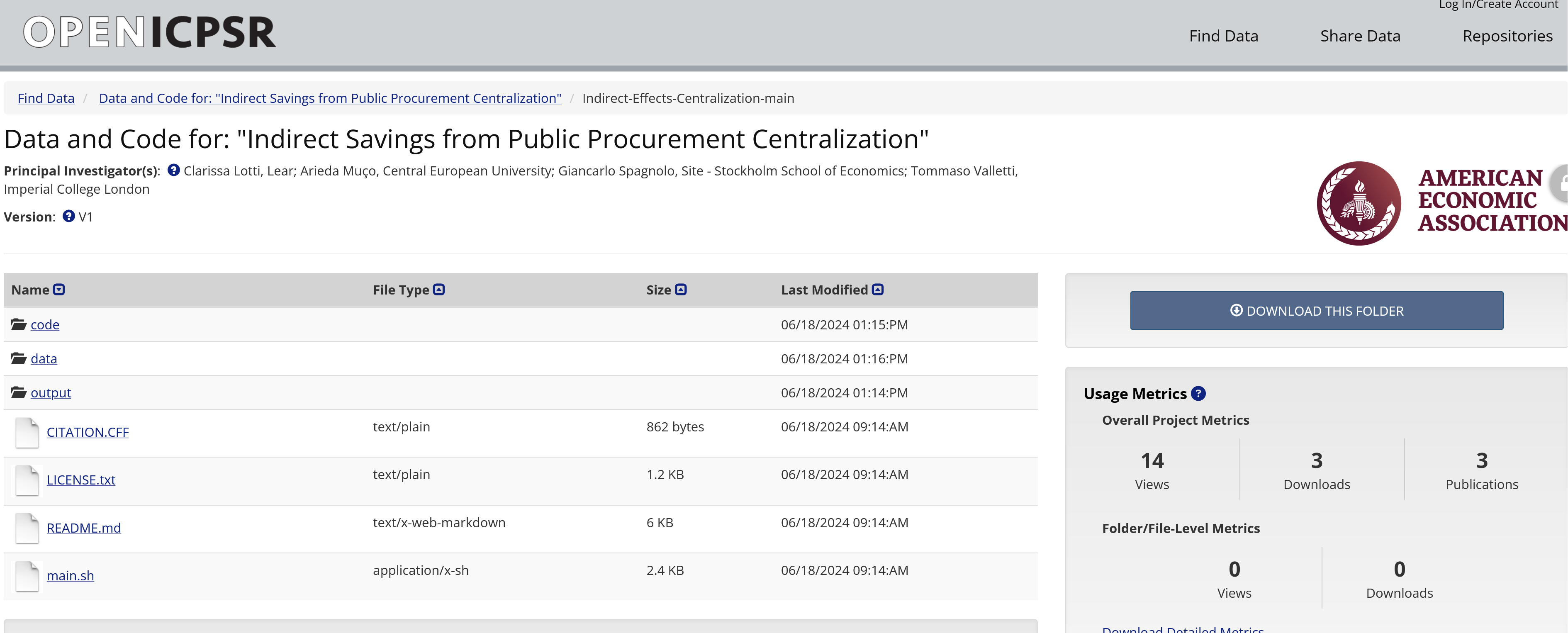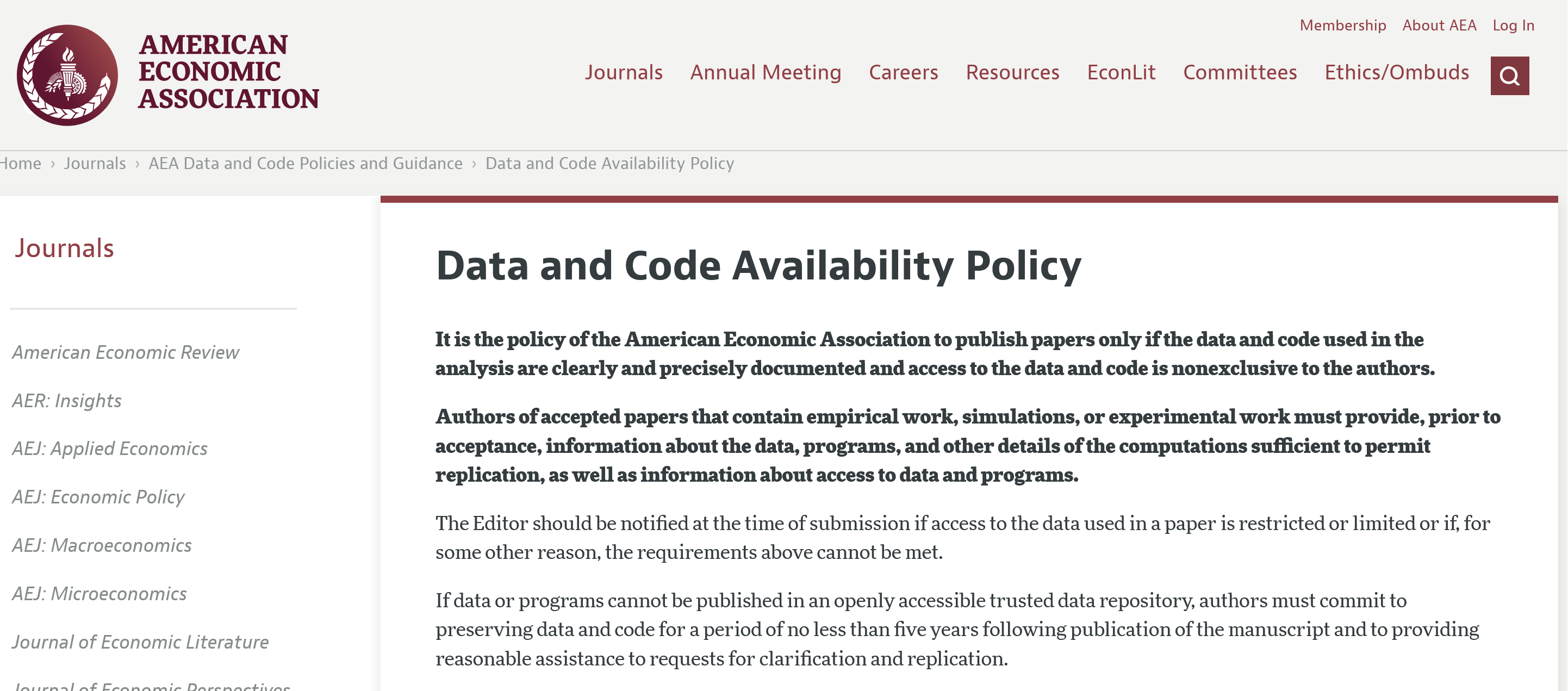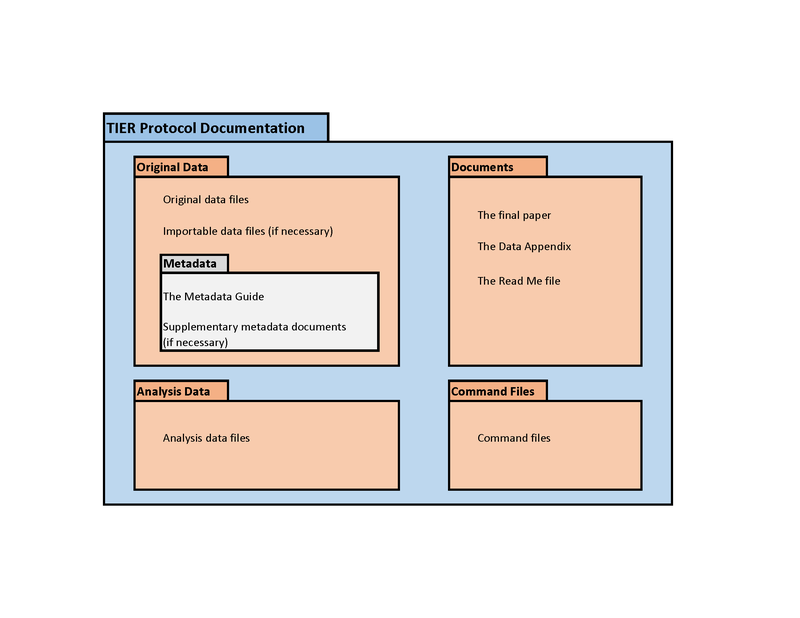Reproducibility from Day 1
2025-01-01
Follow along

Reproducibility from Day 1
Journals require that you share your code and data in a replication package at the end of your research project.
Following some best practices from day 1 can not only help you prepare this package later, but also make you more productive researchers.
What is a replication package?
Example of deposit

AEA policy

Goal
Scenario
We start with an empty folder, and an idea.

Does procurement in the EU have a bias towards local providers?
We finish with a mini-project about public procurement across various European countries.
Setup
Tools needed:
- Stata. It is feasible to do the whole exercise in R as well, but examples will be in Stata.
- text editor (we suggest VS Code)
- web browser
- file browser (e.g., Windows Explorer, Finder, Nautilus, etc.)
First steps
- Create an empty folder, like
Desktop/day1 - Navigate to this folder in Stata:
cd ../Desktop/day1 - Open this folder in your text editor, if it can open folders (optional)
- Google “CEPII GeoDist”
Keeping on top of provenance
- Licenses
- Streamlining for reproducibility
Licenses
Where does the file come from?
- How can we describe this later to somebody?
- Point and click is long to describe
- What are the rights we have?
What is a license?
A license (licence) is an official permission or permit to do, use, or own something (as well as the document of that permission or permit).1 2
Examples
- Creative Commons licenses, used for artistic products and data
- Open Source licenses (BSD, GPL, MIT, etc.), used for software (code)
License applying to Geodist data
- CEPII GeoDist is under an “Etalab 2.0 license”
Can we re-publish the file?
Various guidance pages provided by data editors and others:
Downloading via code
Easiest:
Stata
Why not?
- will it be there in two months? in 6 years?
- what if the internet connection is down?
Easy:
Stata
R
We will get to even better methods a bit later
Creating a README
- Template README
- Cite both dataset and working paper
- Add data URL and time accessed (can you think of a way to automate this?)
- Add a link to license (also: download and store the license)
Link
Structure of the project
Folder by function
Let’s start with something easy. Separate folders for each function: code/ and data/
TIER Protocol
- The TIER Protocol is a set of guidelines for organizing reproducible research.

TIER Protocol
Scripts by function
We will download -> Create a script download_data.do
Paths in scripts
🛑Do not hard-code paths!
copy "$URL" "C:\Users\lv39\Desktop\day1\data\dist_cepii.dta", replaceWhy?
Names in scripts
🛑Do not rename data files!
copy "$URL" "C:\Users\lv39\Desktop\day1\data\that_file_from_cepii.dta", replaceWhy?
Expanding data downloads
Redo the same thing for other data
- Tender data: https://data.europa.eu/euodp/en/data/dataset/ted-csv
- Country codes: https://datahub.io/core/country-codes
Link
Data Cleaning
Need to merge the data
Write a merging script. Create the sample.
These two can go in the same script, create_analysis_sample.do
Where does the merged data go?
No overwriting of original data!
- The raw data should go into a
data/rawdirectory. - The merged data should go in the
data/deriveddirectory.
Moving things around
- Create directories
- Consolidate paths
Link
Making code more robust
- Re-running takes time
- What if a file is no longer there?
- What if we need packages
Making download code robust
- Only download if necessary
- file is missing
- file has changed
Robust download code (Stata)
Download only if we want to download
Robust download code (2)
Automatically download the file again if not there.
Robust download code (3)
What if the file has changed?
if $redownload == 1 {
copy "https://datahub.io/core/country-codes/r/country-codes.csv" "data/raw/country-codes.csv", replace
// create checksum of file
// Aug 2023 version: 2295658388
global countrycksum 2295658388
checksum "data/raw/country-codes.csv", save
assert $countrycksum == r(checksum)
// This will fail if the files are not identical
// Provide a verbose message if we get past this point
disp in green "Country codes file downloaded successfully"
} Robust download code (5)
Be informative!
Link
Use the main file to control larger pieces
Change flags, don’t comment out code
No manual manipulation
- “Change the parameter to 0.2, then run the code again”
- “Compute the percentages for Table 2 by hand”
Systematic automation
- Use functions, ado files, programs, macros, subroutines
- Use loops, parameters, parameter files to call those subroutines
- Use placeholders (globals, macros, libnames, etc.) for common locations ($CONFDATA, $TABLES, $CODE)
- Compute all numbers in package
- No manual calculation of numbers
Example (1)
Example (2)
Here we always run the 00_setup.do file.
Example (3)
Then conditionally run the other pieces:
Starting to be complex
- Let’s use a separate
config.dofile to contain configuration parameters
Example (4)
So let’s automate some of this:
Example (5)
Example (6)
Configure the steps on certain conditions:
// define steps
global step1 1
global step2 1
// verify if file has changed
qui checksum "$resultfile1"
// if not, don't run Step 2
if `r(checksum)' == $checksum1 global step2 0
// Nothing needs to be changed here
do "$rootdir/code/00_setup.do"
if $step1 == 1 do "$rootdir/code/01_download_data.do"
if $step2 == 1 do "$rootdir/code/02_create_analysis_sample.do"
if $step3 == 1 do "$rootdir/code/03_analysis.do"and config.do contains additional information:
// file locations
// code to set rootdir omitted
global inputdata "$rootdir/data/inputs"
global tempdata "$rootdir/temporary"
global outputs "$rootdir/tables-figures"
// ensure they are created
cap mkdir "$tempdata"
cap mkdir "$outputs"
// some key parameters
global resultfile1 "$outputs/table1.tex"
global checksum1 386698503Why can this be useful?
Consider a final test if everything runs:
- delete
temporary/andtables-figures/folders. - might even delete the downloaded files
- then run the
main.dofile again.
This will test if everything works!
Secrets in the code
What are secrets?
- API keys
- Login credentials for data access
- File paths (FSRDC!)
- Variable names (IRS!)
Standard practice
Store secrets in environment variables or files that are not published.
Some services are serious about this

Github secret scanning
Where to store secrets
- environment variables
- “dot-env” files (Python), “Renviron” files (R)
- or some other clearly identified file in the project or home directory
Environment variables
Typed interactively (here for Linux and Mac)
(this is not recommended)
Storing these in files
Same syntax used for contents of “dot-env” or “Renviron” files, and in fact bash or zsh startup files (.bash_profile, .zshrc)
Using In R
Edit .Renviron (note the dot!) files:
# Edit global (personal) Renviron
usethis::edit_r_environ()
# You can also consider creating project-specific settings:
usethis::edit_r_environ(scope = "project")Use the variables defined in .Renviron:
Using In Python
Loading regular environment variables:
Loading with dotenv
Using in Stata
Yes, this also works in Stata
// load from environment
global mysecret : env MYSECRET
display "$mysecret" // don't actually do this in codeand via (what else) a user-written package for loading from files:
{.stata code-line-numbers="1-3} net install doenv, from(https://github.com/vikjam/doenv/raw/master/) doenv using ".env" global mysecret "`r(MYSECRET)'" display "$mysecret"
Simplest solution
//============ confidential parameters =============
capture confirm file "confidential/confparms.do"
if _rc == 0 {
// file exists
include "confidential/confparms.do"
} else {
di in red "No confidential parameters found"
}
//============ end confidential parameters =========
//============ non-confidential parameters =========
include "config.do"
//============ end parameters ======================Confidential code?
What is confidential code, you say?
- In the United States, some variables on IRS databases are considered super-top-secret. So you can’t name that-variable-that-you-filled-out-on-your-Form-1040 in your analysis code of same data. (They are often referred to in jargon as “Title 26 variables”).
- Your code contains the random seed you used to anonymize the sensitive identifiers. This might allow to reverse-engineer the anonymization, and is not a good idea to publish.
What is confidential code, you say?
- You used a look-up table hard-coded in your Stata code to anonymize the sensitive identifiers (
replace anoncounty=1 if county="Tompkins, NY"). A really bad idea, but yes, you probably want to hide that. - Your IT specialist or disclosure officer thinks publishing the exact path to your copy of the confidential 2010 Census data, e.g., “/data/census/2010”, is a security risk and refuses to let that code through.
What is confidential code, you say?
- You have adhered to disclosure rules, but for some reason, the precise minimum cell size is a confidential parameter.
What is confidential code, you say?
So whether reasonable or not, this is an issue. How do you do that, without messing up the code, or spending hours redacting your code?
Example
- This will serve as an example. None of this is specific to Stata, and the solutions for R, Python, Julia, Matlab, etc. are all quite similar.
- Assume that variables
q2fandq3eare considered confidential by some rule, and that the minimum cell size10is also confidential.
Do not do this
A bad example, because literally making more work for you and for future replicators, is to manually redact the confidential information with text that is not legitimate code:
set seed NNNNN
use <removed vars> county using "<removed path>", clear
gen logprofit = log(XXXX)
by county: collapse (count) n=XXXX (mean) logprofit
drop if n<XXXX
graph twoway n logprofitThe redacted program above will no longer run, and will be very tedious to un-redact if a subsequent replicator obtains legitimate access to the confidential data.
Better
Simply replacing the confidential data with replacement that are valid placeholders in the programming language of your choice is already better. Here’s the confidential version of the file:
//============ confidential parameters =============
global confseed 12345
global confpath "/data/economic/cmf2012"
global confprofit q2f
global confemploy q3e
global confmincell 10
//============ end confidential parameters =========
set seed $confseed
use $confprofit county using "${confpath}/extract.dta", clear
gen logprofit = log($confprofit)
by county: collapse (count) n=$confemploy (mean) logprofit
drop if n<$confmincell
graph twoway n logprofitBetter
and this would be the released file, part of the replication package:
//============ confidential parameters =============
global confseed XXXX // a number
global confpath "XXXX" // a path that will be communicated to you
global confprofit XXX // Variable name for profit T26
global confemploy XXX // Variable name for employment T26
global confmincell XXX // a number
//============ end confidential parameters =========
set seed $confseed
use $confprofit county using "${confpath}/extract.dta", clear
gen logprofit = log($confprofit)
by county: collapse (count) n=$confemploy (mean) logprofit
drop if n<$confmincell
graph twoway n logprofitWhile the code won’t run as-is, it is easy to un-redact, regardless of how many times you reference the confidential values, e.g., q2f, anywhere in the code.
Caveats
- You have to re-run the entire code to obtain a modified graph
- But if the data presented in the graph is non-sensitive (i.e., disclosable), then the data underlying it is as well.
\(\rightarrow\) provide code that
- automatically detects if the confidential data is there (skips if not)
- will always run for the graphing (“analysis”) part of the code.
Best
- Main file
- Conditional processing
- Separate file for confidential parameters which can simply be excluded from disclosure request
Best
Main file main.do:
//============ confidential parameters =============
capture confirm file "include/confparms.do"
if _rc == 0 {
// file exists
include "include/confparms.do"
} else {
di in red "No confidential parameters found"
}
//============ end confidential parameters =========
//============ non-confidential parameters =========
global safepath "releasable"
cap mkdir "$safepath"
//============ end parameters ======================Best
Main file main.do (continued)
// :::: Process only if confidential data is present
capture confirm file "${confpath}/extract.dta"
if _rc == 0 {
set seed $confseed
use $confprofit county using "${confpath}/extract.dta", clear
gen logprofit = log($confprofit)
by county: collapse (count) n=$confemploy (mean) logprofit
drop if n<$confmincell
save "${safepath}/figure1.dta", replace
} else { di in red "Skipping processing of confidential data" }
//============ at this point, the data is releasable ======
// :::: Process always
use "${safepath}/figure1.dta", clear
graph twoway n logprofit
graph export "${safepath}/figure1.pdf", replaceBest
Auxiliary file include/confparms.do (not released)
Best
Auxiliary file include/confparms_template.do (this is released)
//============ confidential parameters =============
global confseed XXXX // a number
global confpath "XXXX" // a path that will be communicated to you
global confprofit XXX // Variable name for profit T26
global confemploy XXX // Variable name for employment T26
global confmincell XXX // a number
//============ end confidential parameters =========Best replication package
Thus, the replication package would have:
Wrapping up the replication package
- Using templates for reproducibility
- Documenting what you did
- When to document
Best replication package
We already had this:
main.do
README.md
include/confparms_template.do
releasable/figure1.dta
releasable/figure1.pdfWhat’s in the README?
Start with our fabulous template README. Really, it helps! Available at https://social-science-data-editors.github.io/template_README/
Three parts to README
- Data availability (and citations)
- Computer requirements
- Description of processing
Start with the last part
That’s easy: you’ve been keeping clean instructions since the start, right?
- Run “
main.do” - Describe what parts might be skipped
- Describe what the various parts do
- Describe which parts use confidential data
You’ve been doing that since day 1!
Computer requirements
In most confidential environments, such as FSRDC/ IRE, this part is out of your control. But describe it anyway!
- Approximate description of computers/nodes used
- memory size (but interested in actual usage, not max of what the system has!)
- compute time! How long does a clean run, from top to bottom, take?
- number of nodes: any parallel processing?
- Software
- Version of software (Stata 17, update level)
- All packages! Ideally, version of package (
which estout)
Some of that is captured in your notes (updated, remember?), some of that may change over the life of the project, and may be captured in your logs, or your qsub files.
Data availability
- This is easy: it’s the data you requested to have included in your FSRDC project!
- So you had this info from Day -90 of the project!
Data availability redux
In order to describe data availability, split into two:
- how did YOU get access to the data (that’s old)
- how can OTHERS get access to the same data (that might be different!)
- The two are not always the same, but are both relevant.
Examples
Examples include
- this excellent description from a paper by Teresa Fort (ReStud):
- All the results in the paper use confidential microdata from the U.S. Census Bureau. To gain access to the Census microdata, follow the directions here on how to write a proposal for access to the data via a Federal Statistical Research Data Center: https://www.census.gov/ces/rdcresearch/howtoapply.html.
- You must request the following datasets in your proposal:
- Longitudinal Business Database (LBD), 2002 and 2007
- Foreign Trade Database – Import (IMP), 2002 and 2007
- Annual Survey of Manufactures (ASM), including the Computer Network Use Supplement (CNUS), 1999
- […]
- Annual Survey of Magical Inputs (ASMI), 2002 and 2007
- Reference “Technology and Production Fragmentation: Domestic versus Foreign Sourcing” by Teresa Fort, project number br1179 in the proposal. This will give you access to the programs and input datasets required to reproduce the results. Requesting a search of archives with the articles DOI (“10.1093/restud/rdw057”) should yield the same results.
NOTE: Project-related files are available for 10 years as of 2015.
Examples
Examples include
- this description by Fadlon and Nielsen about Danish data
The information used in the analysis combines several Danish administrative registers (as described in the paper). The data use is subject to the European Union’s General Data Protection Regulation(GDPR) per new Danish regulations from May 2018. The data are physically stored on computers at Statistics Denmark and, due to security considerations, the data may not be transferred to computers outside Statistics Denmark. Researchers interested in obtaining access to the register data employed in this paper are required to submit a written application to gain approval from Statistics Denmark. The application must include a detailed description of the proposed project, its purpose, and its social contribution, as well as a description of the required datasets, variables, and analysis population. Applications can be submitted by researchers who are affiliated with Danish institutions accepted by Statistics Denmark, or by researchers outside of Denmark who collaborate with researchers affiliated with these institutions.
(Example taken from Fadlon and Nielsen, AEJ:Applied 2021).
Three parts to README: timing
| - Data availability (and citations): | Start of project, edit at the end |
| - Computer requirements: | Middle of project |
| - Description of processing: | Middle of project |
with the end really just a last read/edit.
Wrapping it all up
Wrapping up
- Public replication package contains intelligible code, omits confidential details (but provides template code), has detailed data provenance statements
- Confidential replication package contains all the same, plus the confidential code, is archived in the FSRDC
Things to remember
- When doing a disclosure review request, remember to request the code
- When outputting statistics, consider the disclosure rules - the less changes, the faster the output (in theory), but in particular fewer surprises
- Do not think “nobody will ever read this code” - somebody is very likely to!
End
Now you wait for the replicators to show up!
Links
Step 3: General
Step 3 (with robust download code) Stata
Alternatively: https://github.com/datasets/country-codes/blob/master/data/country-codes.csv
- This presentation’s source: https://github.com/larsvilhuber/day1-tutorial/
- Licensed under
![CC BY-NC 4.0]()


